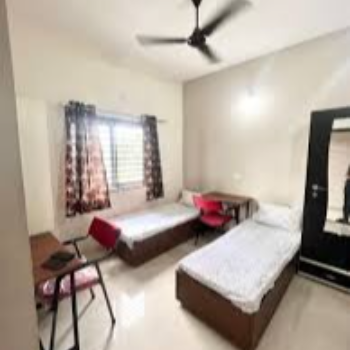In the bustling city of Pune, where skyscrapers pierce the sky and the streets hum with activity, lives a man named Ramesh. Like many others, Ramesh moved to the city, leaving behind his family in a distant village, in search of better job opportunities. He now works in a thriving manufacturing unit on the outskirts of the city. However, the challenge of finding affordable and practical living accommodations in a city like Pune is a daunting task.
Ramesh's story is not unique. Across India, millions of workers like him face the same predicament. The high cost of living, especially in metropolitan areas, forces many to compromise on their living conditions. Cramped spaces, poor sanitation, and long commutes become an unfortunate reality. But there is a solution that is transforming the lives of workers like Ramesh worker hostels and boarding houses.
Worker hostels offer a practical, cost-effective alternative, addressing one of the most pressing problems faced by the Indian workforce inadequate and unaffordable housing. These hostels are designed to provide not just accommodation, but a home away from home. They are equipped with essential amenities, ensuring residents can focus on their work without the constant worry of basic living conditions.
Take, for example, the story of Meena, a garment factory worker in Bengaluru. When Meena first arrived in the city, she struggled to find a suitable place to live. Her initial living arrangement was a small, shared room with six other women, lacking privacy and basic comforts. The daily commute was another challenge, consuming hours and leaving her exhausted. It wasn't until she discovered a nearby worker hostel that her life began to change.
The hostel offered Meena a comfortable bed, clean bathrooms, and a communal kitchen where she could cook meals. More importantly, it was located just a short distance from her workplace, drastically reducing her commute time. This newfound convenience not only enhanced her work-life balance but also improved her overall well-being. Meena's productivity at work increased, and she found herself more energized and motivated.
The impact of worker hostels extends beyond providing shelter. They create a sense of community among residents. Ramesh, for instance, found companionship among his fellow hostel mates. They shared meals, celebrated festivals, and supported each other through the ups and downs of city life. This camaraderie helped alleviate the emotional burden of being away from family, reducing feelings of isolation and loneliness.
For employers, worker hostels present a practical solution to enhancing workforce efficiency. By ensuring their employees have access to affordable and comfortable living conditions, companies can reduce turnover rates and increase job satisfaction. This, in turn, leads to more stable and productive work environments.
Moreover, worker hostels contribute to the local economy by creating jobs in management, maintenance, and hospitality services. They also encourage sustainable living practices, with many hostels incorporating eco-friendly initiatives like rainwater harvesting and waste segregation.
In conclusion, worker hostels are not just about providing a roof over one's head. They represent a paradigm shift in how we address the housing needs of India's workforce. By offering a blend of comfort, community, and convenience, these hostels are pivotal in transforming the lives of workers across the country. For Ramesh, Meena, and countless others, worker hostels have become a beacon of hope, enabling them to pursue their dreams while enjoying a better quality of life.
As more businesses and policymakers recognize the value of worker hostels, we can expect to see a positive ripple effect across industries and communities. It's time to embrace this innovative solution and support the hardworking individuals who form the backbone of our nation's economy.
Visit Vyaparify Site:
https://id.vyaparify.com/man-taz-pg-servicesLocation:
https://maps.app.goo.gl/PSmbS4MwdvHLyP8j9 
